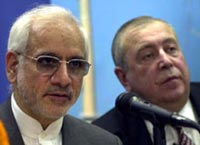|
Iran Warns West on UN Referral
 |
|
“If the Europeans chose a non-peaceful path... it will not be in their interests,” said Larijani. (Reuters).
|
TEHRAN,
January 31, 2006 (IslamOnline.net & News Agencies) - Iran warned
Tuesday, January 31, that the referral of a long-running dispute over
its nuclear program to the UN Security Council will bring “an end to
diplomacy,” saying the move had no legal justification.
“Informing
the Security Council or referring the Iranian case to it will bring an
end to diplomacy and that is not at all positive,” state television
quoted top national security official Ali Larijani as saying, reported
Agence France-Presse (AFP).
In
a joint statement after a four-hour dinner, foreign ministers from six
countries -- the permanent five of Britain, China, France, Russia and
the United States plus Germany -- said they had agreed that the UN
nuclear watchdog “should report to the Security Council its decision
on the steps required of Iran” when the IAEA board meets in Vienna
Thursday, February 2.
But
with Russia and China opposed to a dramatic escalation of the Iran
case, the agreement stopped short of recommending a formal referral of
Iran to the Security Council, where it could face economic sanctions.
“I
do not want to use the term scandalous,” Larijani said of the
decision, adding that Iran "will use all peaceful means to
achieve its nuclear technology rights within the framework of the
Non-Proliferation Treaty.”
“I
still think we can get a good result, but if the Europeans chose a
non-peaceful path... it will not be in their interests," he
added. "We advise them to continue constructive negotiations with
Iran.”
“Inalienable
Right”
The
head of Iran's nuclear negotiating team Javad Vaidi said Iran would
stick by its January 10 move to resume uranium enrichment research --
a sensitive process the West fears will give Iran nuclear weapons
know-how.
“The
research activities are an inalienable right for Iran" and the
decision to resume the work earlier this month -- which triggered the
latest crisis between Tehran and the West -- is “irreversible,” he
said.
He
also insisted that the research work had no links with
industrial-scale production of uranium enrichment which “is still
suspended.”
Iran
has already threatened that if referred to New York -- or even if the
Security Council is merely “informed” -- it would retaliate by
limiting IAEA inspections and resuming large-scale enrichment.
Iran
argues that it only wants to generate electricity and has a right to
possess nuclear technology as a signatory of the NPT.
Not
Legal
 |
|
“The
Europeans cannot find a legal basis within the rules of the IAEA to
send the Iranian dossier to the UN Security Council,” said Agazadeh.
|
Meanwhile,
Iran's Atomic Energy Agency chief Gholamreza Agazadeh told the ISNA
news agency there was no legal justification to bring Tehran before
the Security Council.
“The
Europeans cannot find a legal basis within the rules of the
International Atomic Agency to send the Iranian dossier to the UN
Security Council, and that is their greatest difficulty,” he said.
A
move by Iran to cut off cooperation or a push ahead with nuclear fuel
work would lead to a further escalation of the crisis.
Iran
has been appealing for more time to negotiate with Moscow on a
compromise proposal -- and it remains unclear if an expected Security
Council referral will speed up these talks or prompt Iran to pull out
of them.
Russia's
idea is for Iran's uranium to be enriched on Russian soil, something
that could allay Western fears that Tehran will acquire sensitive
dual-use technology but at the same time guarantee Iran's access to
nuclear energy.
|